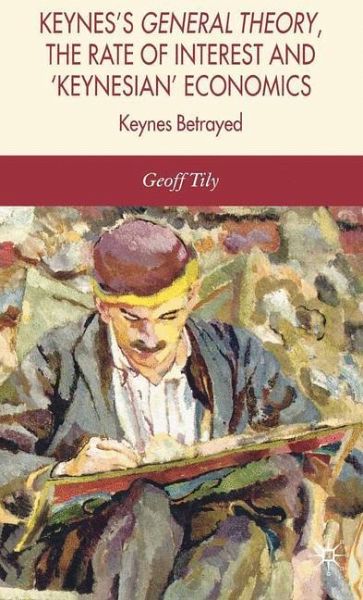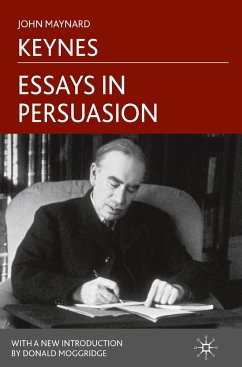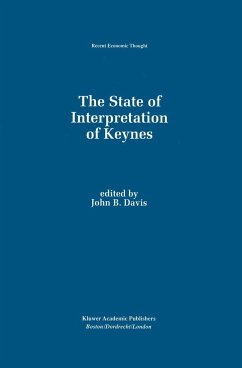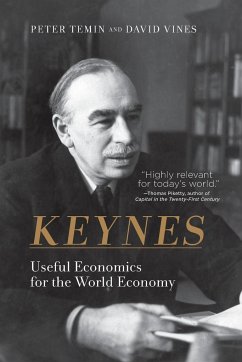
Keynes's General Theory, the Rate of Interest and Keynesian' Economics

PAYBACK Punkte
38 °P sammeln!
Geoff Tily argues that Keynes was primarily concerned with monetary policy, not fiscal policy. Viewed as a coherent whole, Keynes's work was concerned with the appropriate technique and infrastructure for the management of money at low rates of interest. More specifically, his rejection of the gold standard led ultimately to his proposal for an international clearing union to support domestic debt-management and monetary policies aimed at cheap money. His ideas became reality. With the start of the Great Depression, governments across the world began a (short-lived) era of the deliberate manag...
Geoff Tily argues that Keynes was primarily concerned with monetary policy, not fiscal policy. Viewed as a coherent whole, Keynes's work was concerned with the appropriate technique and infrastructure for the management of money at low rates of interest. More specifically, his rejection of the gold standard led ultimately to his proposal for an international clearing union to support domestic debt-management and monetary policies aimed at cheap money. His ideas became reality. With the start of the Great Depression, governments across the world began a (short-lived) era of the deliberate management of money.
While many others have argued that 'Keynesian' economics is a misrepresentation of Keynes's theory, Tily argues that 'Keynesian' economics also permitted a gross misrepresentation of his economic policies. 'Keynesian' economics was a different theory opposed, and indeed rival, to Keynes's work. With the policy perspective restored, an alternative presentation of Keynes's economics, based on post-Keynesian economics, is permitted.
In this revised edition, Geoff Tily argues that the economics profession has distorted and betrayed Keynes's legacy. In virtually all interpretations especially that taught to students Keynes is portrayed as concerned only with government expenditure as a means to cure economic crisis. Yet Keynes's central aim was the prevention of economic crisis. His prescription to do so concerned monetary not fiscal policy.
From the moment the great depression began, Keynes began to influence greatly the monetary policy of the world. Countries, led by the UK and US, put in place capital controls and mechanisms to manage exchange rates, and changes to debt management and credit policies that permitted the orderly management of money at low long-term and short-term interest rates on what should have been a permanent basis. The Bretton Woods negotiations went some way to re-enforce and formalise these policies, but did not go far enough.
The current crisis is rooted in the dismantling of the remnants of the Bretton Woods architecture and the liberalisation of finance that began even before 1970. Tily argues that we should not be surprised that the neglect of Keynes's policies is leading to a crisis of similar magnitude to the depression that motivated the development and implementation of those policies in the first place. It is to the same policies that we must turn, as the crisis becomes a reality.
This book argues that Keynes was primarily concerned with monetary policy not fiscal policy, and that the loss of these conclusions is of grave consequence
While many others have argued that 'Keynesian' economics is a misrepresentation of Keynes's theory, Tily argues that 'Keynesian' economics also permitted a gross misrepresentation of his economic policies. 'Keynesian' economics was a different theory opposed, and indeed rival, to Keynes's work. With the policy perspective restored, an alternative presentation of Keynes's economics, based on post-Keynesian economics, is permitted.
In this revised edition, Geoff Tily argues that the economics profession has distorted and betrayed Keynes's legacy. In virtually all interpretations especially that taught to students Keynes is portrayed as concerned only with government expenditure as a means to cure economic crisis. Yet Keynes's central aim was the prevention of economic crisis. His prescription to do so concerned monetary not fiscal policy.
From the moment the great depression began, Keynes began to influence greatly the monetary policy of the world. Countries, led by the UK and US, put in place capital controls and mechanisms to manage exchange rates, and changes to debt management and credit policies that permitted the orderly management of money at low long-term and short-term interest rates on what should have been a permanent basis. The Bretton Woods negotiations went some way to re-enforce and formalise these policies, but did not go far enough.
The current crisis is rooted in the dismantling of the remnants of the Bretton Woods architecture and the liberalisation of finance that began even before 1970. Tily argues that we should not be surprised that the neglect of Keynes's policies is leading to a crisis of similar magnitude to the depression that motivated the development and implementation of those policies in the first place. It is to the same policies that we must turn, as the crisis becomes a reality.
This book argues that Keynes was primarily concerned with monetary policy not fiscal policy, and that the loss of these conclusions is of grave consequence














